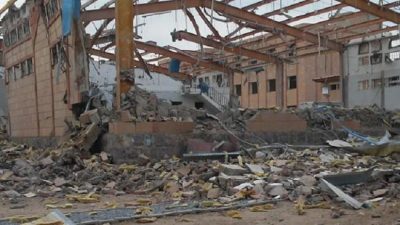MSF Ceases Activities in Northwestern Yemen After Saudi Airstrike Hit Medical Center

Featured image: This photo shows the aftermath of a Saudi-led airstrike against an MSF-supported cholera treatment center in Yemen’s northwestern province of Hajjah, on June 11, 2018. (Photo by MSF)
Doctors Without Borders (MSF) says it has “temporarily frozen” its humanitarian activities in northwestern Yemen after an airstrike carried out by warplanes of a Saudi-led military coalition hit a cholera treatment center run by the international medical charity.
“This morning’s attack on an MSF cholera treatment center by the Saudi and Emirati-led coalition shows complete disrespect for medical facilities and patients,” said Joao Martins, MSF’s head of mission in Yemen, in a statement on Monday.
His comments came hours after Saudi-led fighter jets struck a newly-built clinic of MSF in the Abs district in the northwestern province of Hajjah. Martins said that the center had been empty at the time of the airstrike, hence, left no casualties.
He added that the facility’s roof clearly identified it as a medical center and that its coordinates had been previously given to the so-called Saudi-led coalition.
“MSF has temporarily frozen its activities in Abs until the safety of its staff and patients is guaranteed,” Martins further said.
Since July 2015, the international charity group has been supporting the Abs hospital, which according to the MSF, is just one kilometer away from the cholera treatment center targeted on Monday.
On August 15, 2016, a Saudi-led airstrike ripped through part of the Abs hospital, killing 19 people, including an MSF staff member. It also inflicted injuries to 24 others. Shortly after the deadly aggression, MSF suspended operations in several facilities in the country’s north.
However, the group returned to Abs in last November after the hospital’s reconstruction was complete. Since then, MSF has employed some 200 national workers and a dozen international medical professionals.
In December 2016, the so-called coalition admitted that it had hit the MSF-supported hospital due to an “unintentional mistake.”
MSF’s renewed halt in operations comes just four days after the International Committee of the Red Cross announced that it had evacuated 71 staff members from Yemen due to security concerns.
Saudi Arabia and its allies launched the war on Yemen in March 2015 to install a former regime that had been loyal to Riyadh.
The Yemeni Ministry of Human Rights announced in a statement on March 25 that the Saudi-led war had left 600,000 civilians dead and injured until then.
The war and an accompanying blockade have caused famine across Yemen. The United Nations says a record 22.2 million people are in need of food aid, including 8.4 million threatened by severe hunger.
The Saudi aggression has also taken a heavy toll on the country’s facilities and infrastructure, destroying many hospitals, schools, and factories.
Since 2016, the impoverished nation has also been grappling with a deadly cholera outbreak, which has already killed thousands of people.
Several Western countries, the US and the UK in particular, are accused of being complicit in the aggression as they supply the Riyadh regime with advanced weapons and military equipment as well as logistical and intelligence assistance.

